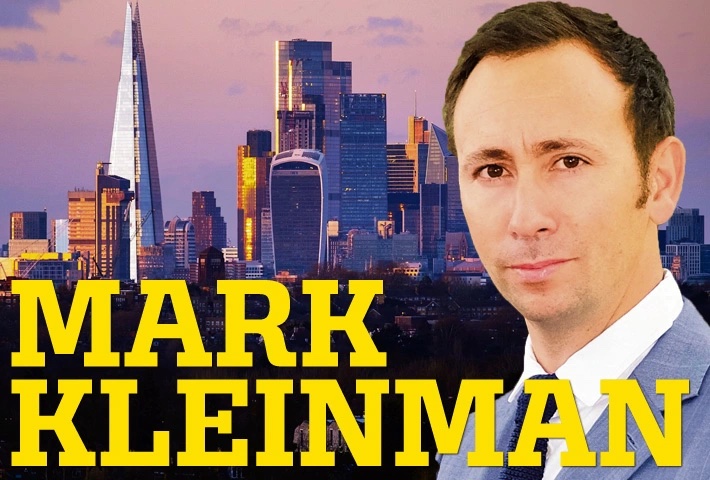Mark Kleinman: The must-read City column

Mark Kleinman, City editor of Sky News, writes fortnightly for City A.M. This week he opines on the ICAEW, Eton’s new Provost and the future of the Telegraph
Don’t do as I do, do as I say. That appears to be a fitting mantra for the Institute of Chartered Accountants in England and Wales (ICAEW), which loves to virtue-signal about the importance of effective corporate governance among its members.
Examples abound of backslapping and self-congratulation from the body. As an example, how about this corker from 2018, in response to a government consultation on executive pay?
“Boards need to put themselves in a position where they can be confident, open and fearless in publicly explaining who gets paid what and why,” it said.
“Individual board directors must feel able to deliver a public explanation regardless of whether or not an explanation is actually requested or required, or whether they are the chosen spokesperson.”
It’s only natural, then, that faced with an enquiry about why Michael Izza, its retiring chief executive, is to receive a six-figure payment when he leaves at the end of this year, its approach was to obfuscate and evade.
The idea that he would get a sum roughly equal to twice his £492,000 basic salary was met with derision. Eventually, an insider suggested that the actual amount was more like £250,000; yet the ICAEW refused to quantify it precisely, saying that we would have to wait until the publication of next year’s annual report to find out.
The “terms of his departure are in compliance with his contract of employment,” was all it would say officially.
Why Izza’s contract states that he should get a six-figure windfall purely for retiring is a mystery. It sounds highly inappropriate from a governance perspective.
The ICAEW has been at the centre of a long-running row about its retention of fines imposed on the audit industry. Asked last year whether a £13.5m penalty imposed on KPMG over its botched audit of Silentnight, the beds retailer, should instead be repatriated to the pensioners who lost out financially from its collapse, Izza is reported to have said that it wasn’t the role of the Accountancy Scheme to compensate them.
Instead, he has presided over an accumulation of fines from miscreants which has generated reserves totalling well in excess of £100m.
These funds, the body has said in the past, are used to aid its purpose of “serving the public good”. That’s not nearly transparent enough. Virtue-signalling trade associations are, as the CBI has so vividly demonstrated, rightly being subjected to greater scrutiny.
In the case of the ICAEW, which also has a regulatory role, that’s even more crucial. The body is on the brink of a governance shake-up, having announced that it would appoint an independent chair for the first time. The secrecy surrounding Izza’s payoff suggests that move is overdue.
Bet on a new player taking the reins of the Telegraph
Anyone but Boris: that probably sums up what Rishi Sunak is thinking in relation to most things after the events of the last week, but nowhere would it be more applicable than the future ownership of The Daily Telegraph.
No sooner had Lloyds Banking Group seized control of the presses from the Barclay family than the former PM was being linked with a bid for control of the Tory-supporting newspapers.
Johnson, awash with cash from speaking engagements and with a surfeit of time on his hands after the resignation of his Commons seat, might well fancy using the Telegraph as a Sunak-bashing vehicle in the run-up to next year’s general election – and then ride to Britain’s political rescue in its aftermath.
That idea looks rather more fanciful than Lloyds’ hopes of drawing a £600m price tag for the papers, though. The business has seen a commercial revival only partly driven by cost-cutting in recent years, and profits for the latest financial year are expected to show a significant uplift, according to reports.
While some may scoff at the idea of newspapers still being regarded as trophy assets, the line-up of prospective suitors is certain to be long and prestigious. My money is on them ending up in the embrace of a proprietor new to the industry in Britain, and not being folded into the empires of either Rupert Murdoch or Lord Rothermere.
Could Eton turn to Morrissey?
Anyone for an Eton mess? It was intriguing to read in The Daily Mail that the final round of interviews for the Provost of arguably the world’s most famous school was due to take place this week.
According to the newspaper, the two “key figures” on the shortlist are Sir Nicholas Coleridge, the former Conde Nast boss, and General Sir Nicholas Carter, former Chief of the Defence Staff.
But I understand another prominent name has also been in the mix: Dame Helena Morrissey, former boss of Newton Investment Management and former chair of AJ Bell, the retail investment platform.
Morrissey, who couldn’t be reached for comment, has famously juggled her City career with an all-consuming family life – understandably, given that she has raised nine children with husband Richard.
At £46,296-a-year, the annual bill for all of those offspring were they to have attended Eton simultaneously would have been close to £420,000. The arch-Brexiter and recent critic of the CBI is surely a formidable candidate to beat.
